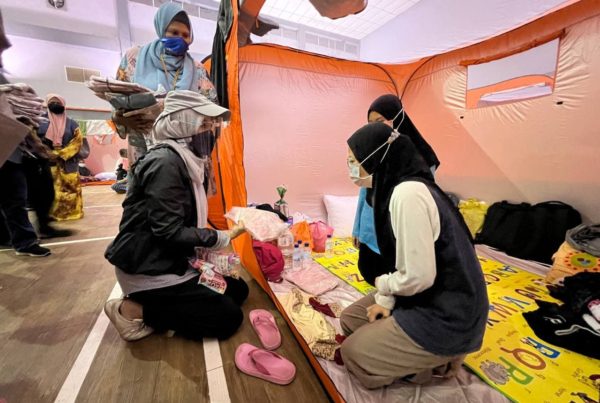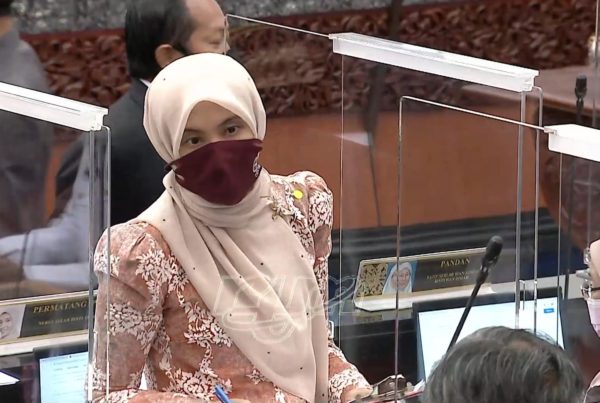by Deborah Loh from The Nut Graph
Name : Nurul Izzah Anwar
Constituency: Lembah Pantai
Party: PKR (Opposition)
Years as MP: Since 2008
Government position: None
Party position:
Lembah Pantai division chief (pro-tem)
Membership in parliamentary committees or caucus:
Women’s Caucus
Asian Inter-Parliamentary Malaysian Caucus
Would you support the abolition/review of the Internal Security Act (ISA), in particular the provision that allows for detention without trial?
I began my political education with the knowledge that the ISA is a draconian and oppressive Act that is used in Malaysia to silence dissent related to the Barisan Nasional (BN).
It is a basic principle in law, as well as Islamic teachings, that a person is innocent until proven guilty. That fact led to my active campaign against the ISA, with [non-governmental organisation Suara Rakyat Malaysia or Suaram], back in the political upheaval of 1998 — championing my father’s release from political incarceration, as well as many others held behind bars under the ISA.
That knowledge left such an impression on me that there is no turning back from [my stand that the Act should be abolished]. Terrorist threats or not, it is open to abuse, and has repeatedly been abused by the powers-that-be.
There are sufficient avenues in an open court to deal with concrete threats. Suspects should be charged in court when the authorities have sufficient evidence to do so, i.e. when there is a prima facie case.
 2. Do you think Malaysia should be a secular or an Islamic state? Why?
2. Do you think Malaysia should be a secular or an Islamic state? Why?
The term “secular” or “Islamic” has been abused repeatedly by the ruling BN coalition, especially Umno. How can anyone categorically state what Malaysia falls under?
I am confident in the Pakatan Rakyat (PR)’s stance to uphold the Federal Constitution. We are not changing Islam as the religion of the federation, or anything else related to Malay [Malaysian] rights, despite what [some] would like to allege against us.
 3. How do you define your role as an elected MP? Does Parliament provide you with the necessary infrastructure and support to fulfill your role?
3. How do you define your role as an elected MP? Does Parliament provide you with the necessary infrastructure and support to fulfill your role?
As an elected MP, I am the voice for my constituents.
At the ground level, minus a local government and state assemblypersons, MPs are expected to address local issues and problems, which directly fall under the purview of DBKL (Kuala Lumpur City Hall) — the enforcer, service provider and overall caretaker.
Unfortunately, since DBKL, and even the police force, are not elected, they remain unaccountable to the rakyat. This situation poses quite a challenge to the PR Kuala Lumpur MPs. [Federal constituency allocations also] escape [PR] MPs’ hands and go directly to the ruling party.
It is a steep learning curve that can be useful for MPs as well as their constituents — [to learn] that MPs, as legislators, should be allowed and be given the necessary resources to keep track of Parliament’s day-to-day activity as it makes new laws and be allowed to reject terrible laws, and to check [on] the government’s work.
When in Parliament, each MP should be given research support to aid us during the introduction of bills and specific issues pertinent to the nation. Our Parliament does not provide MPs with the necessary infrastructure and support — a new laptop or personal computer is surely no replacement for consistent research support.
 4. Would you support a Freedom of Information Act? Why or why not?
4. Would you support a Freedom of Information Act? Why or why not?
Yes I would. It would go a long way in introducing a culture of transparency and accountability.
However, the current state of the Malaysian Parliament disallows any private member bills (such as the one Subang MP R Sivarasa brought for such an act) to see the light of day. Priority is given for ministerial matters, as well as government-related agenda only.
This situation only feeds the government’s needs while marginalising the needs of civil society.
 5. If there was one thing you could do to strengthen parliamentary democracy in Malaysia, what would it be?
5. If there was one thing you could do to strengthen parliamentary democracy in Malaysia, what would it be?
Immediately set up a system where select committees are allowed to exist and debate on selected topics.
As it stands now, all 222 MPs are fighting for their chance to speak in the Dewan Rakyat, with no time allocation for specific issues to be debated at length. The DNA Identification Bill 2008, for example, has ramifications affecting all Malaysians. There should have been a select committee created, consisting of MPs from different parties, who are then allowed to debate and come up with a nuanced version of the bill before [it was] approved.
In the long term, we seriously need to relook at just how subservient our Parliament has become — negating any separation of powers that we might think we have.
 5. Do you believe in separation of powers between the government, Parliament and judiciary? Why or why not?
5. Do you believe in separation of powers between the government, Parliament and judiciary? Why or why not?
Malaysia is governed by three major institutions — the legislative, executive, and judiciary. These three institutions need to function without interference from each other under the doctrine of separation of power.
In turn, the doctrine guarantees that the institutions can work independently so as to avoid one institution from becoming too powerful. Each institution should function as a check and balance to the other. Only when we have total separation of powers can we then call our country truly democratic.
Hence, I call upon the government to take the first step towards this end by [making] our key institutions such as the police and the attorney-general’s chambers answerable to Parliament instead of the prime minister.
The various abuses currently taking place are a direct result of such a powerful Malaysian executive. A clear example is the attorney-general, who is also the legal adviser to the [government] — a clear conflict between [serving] the judiciary and the executive.
As for the judiciary, what more can I say?
Judicial reform is a fundamental need we cannot do without. Unfortunately, I can say there is no sign towards improving judicial integrity. What we have is continuing wastage of public funds on royal commissions. To date, no action has been taken on the recommendations made by the Royal Commission on the VK Lingam tape. Apparently judicial fixing is not a crime in Malaysia.
In sum, we have a long way to go, and we need a huge dose of political will, before true separation of powers becomes a reality in our democracy.



